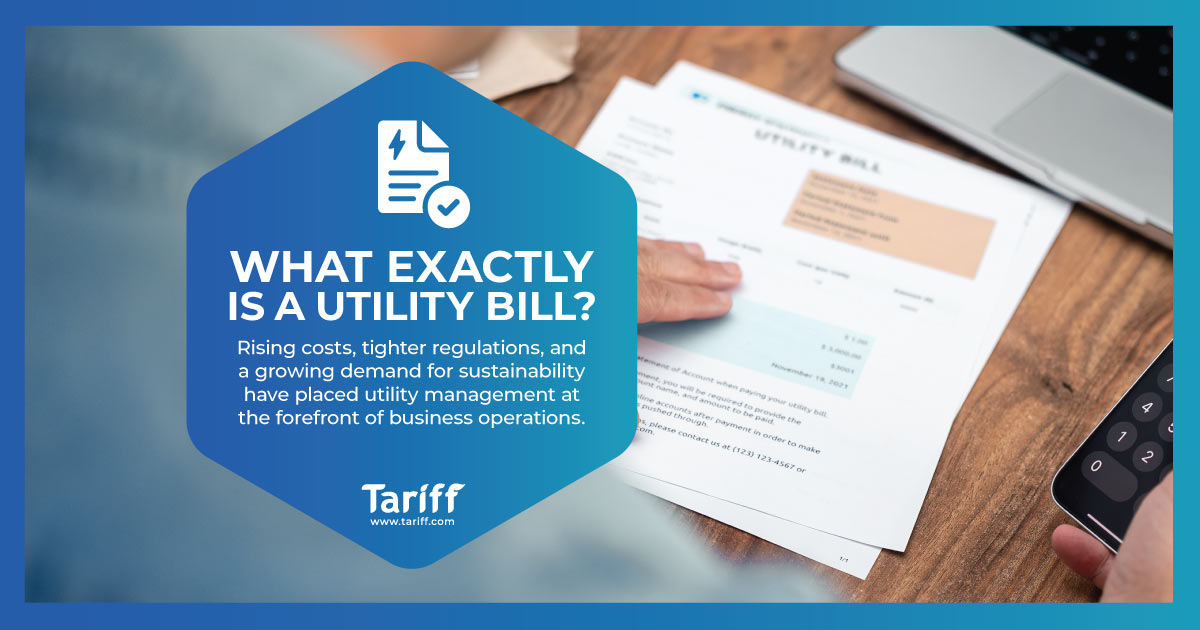Your Business Gas Bill Explained
It’s an age-old challenge, understanding our utility bills. With so much industry-specific terminology and often difficult-to-understand acronyms, it can be easy to get lost in learning what you need to pay and why.
That’s especially true of business gas bills, which have several key differences from both our domestic bills, and any electricity bills we might have already seen. That’s something we’re constantly aware of here at Tariff, and especially so as one of the UK’s leading business energy switching services.
As part of our continuing commitment to transparency and education, we’ll be using our latest article to break down everything you need to know about your business’ gas bill, what it all means, and how it’ll impact what you pay.
The Different Types Of Business Gas Contracts
One of the key factors in what you pay (and how you pay it) for business gas is the contract you have with your supplier. Some suppliers will offer a huge range of contracts, while others will specialise in a specific length or type of contract.
Here are the two options you’ll usually be presented with for your business gas, and what they mean, as well as what can happen if you aren’t properly contracted with a supplier.
Fixed Rate Business Gas
One of the two more prominent types of contract across business gas, a fixed rate contract (also called a fixed tariff or set rate contract) ensures you pay a set amount for every kilowatt hour (kWh) of energy you use.
This does not mean you’ll pay the same amount every month – it only means you’ll pay a consistent price per kWh that you use.
Variable Rate Business Gas
The second of the more prevalent contract types, a variable rate (also referred to as a variable tariff) means your price per kWh isn’t set for the duration of your contract, but instead can fluctuate based on the changing energy market.
While this doesn’t offer the same level of stability that a fixed rate contract can, it does mean that the price you pay can reduce over the duration of your contract. It also means, however, that the price you pay could increase – it’s all dependent on the volatility of the energy market.
Deemed & Out-of-Contract Business Gas
While rare, you may also find yourself on what’s called a deemed rate contract. You’ll most commonly find yourself on a deemed rate contract if you move into a new premises but haven’t yet agreed a contract with an energy provider.
Out-of-contract means just that – this only applies if your contract with your current supplier ends, and there’s no stipulations or plans for when this happens, meaning you use energy that you haven’t been contracted for.
These are both extremely expensive, so it pays (both metaphorically and literally) to be prepared when it comes to your business gas contracts.
How Are Business Gas Contracts Different To Domestic Ones?
While many assume that business gas is exactly the same as that which we get in our homes, there are a few key differences to be aware of as you choose your business energy provider. Let’s break these down in more detail, and why they’re key considerations to make.
1. Business Gas Contracts Are Usually Longer
The main distinction between domestic and business energy, and one that many businesses often overlook as they browse their options, is that contracts for business gas are usually longer than those we’ll see at home.
While they can last as little as 12 months, they’re most commonly run for between 1 and 3 years, with some providers offering contracts of up to 5 years. This is often because businesses will have a more consistent level of energy usage, and there’s less likely to be changes to their circumstances than there is in an average home.
You’re tied into the contract until close to the end of its duration, at which time you’ll enter what’s referred to as a “switching window”. In this time, you’ll either need to agree a new contract with that current provider or source a new supplier, else you’ll be moved over to a deemed or out-of-contract rate, which is significantly more expensive.
2. You Can’t Combine Business Gas & Electricity
Unlike your domestic energy bills, you cannot have what’s called a dual-fuel contract, which is where electricity and gas are combined into one simple-to-understand bill. Businesses can only get single-fuel contracts, meaning you’ll receive separate bills for your gas and electricity.
While this can prove an obstacle for some, it does ensure that you’re able to find the cheapest rates across both business electricity and gas, especially through using a dedicated business energy switching service like Tariff.
3. There’s Rarely A Cooling Off Period In Business Energy
If you’ve got any experience in organising a domestic energy deal, you might have some familiarity with the cooling off period. This is a timeframe of 14 days that allows you to cancel your agreed-upon contract with your energy supplier with no penalty.
Businesses generally will not be allowed that same grace period. However, while the majority won’t allow it, it is always worth asking, or mentioning to your energy switching service provider that this would be beneficial.
The 2 Key Costs You’ll See On Your Business Gas Bill
While we’re often tempted to ignore the breakdown of our charges in favour of looking at how much we’ll pay, it’s crucial we understand why we’re paying the figure we are. That’s especially true of businesses, particularly from a budgetary perspective.
Outside of the type of contract you opt for, there are two key charges you’ll see on your bill. Let’s break those down, and explain what contributes towards the amount you’ll pay.
The Unit Cost
Also called the Unit Rate, this is the amount you pay for the gas you’ve actively used, shown in kilowatt hours (kWh). On a fixed rate contract, this will be frozen at a price point that’s agreed at the start of your tenure with your provider, but with a variable rate contract, this can either rise or fall over the course of your contract.
This is set based on various different factors, including the current market value, as well as a range of geopolitical and environmental factors.
Standing Charge
A familiar part of any energy bill, the standing charge refers to the rate you’ll pay to maintain connection to the gas grid, and is applicable to every business, regardless of how much gas or power you use.
There are a few business gas suppliers who won’t factor in a standing charge, but this usually means that the additional cost of it is instead added onto other areas of your bill, such as the unit cost.
Hidden Business Gas Bill Costs You Won’t See
However, while you’ll be able to view what you pay for both your standing charges and unit cost, there are multiple different factors that contribute towards these rates. While most providers don’t display these in an effort to be more concise and make the costs easier to understand, they do still make a difference.
At a glance, as part of your per-unit and standing charges you’ll be paying for:
- Wholesale Costs – This is the baseline charge you’ll pay to purchase the gas from your supplier. It contributes towards your overall unit cost.
- Transmission Use Of System Charges (TNUoS) – A levied charge that’s added to contribute towards the upkeep and maintenance of the National Grid. It’s included in your standing charge.
- Distribution Use Of System (DUoS) – Directly related to the TNUoS, this covers the upkeep and cost of receiving your gas from a region-specific distribution station. This is split between your standing charge and your unit cost.
- VAT (Value Added Tax) – A governmental charge of 20% that’s applied to any business that uses over 4,397 kWh per month. It’s unavoidable, unfortunately, although a reduced rate (5%) is applied to small businesses who use less than the threshold of 4,397 kWh per month, and charities and other non-profit organisations can be exempted.
- Climate Change Levy (CCL) – Included as part of the unit cost, this is a recently introduced environmental tax that aims to promote lower-carbon forms of energy, such as renewables and green energy, in favour of more conventional forms like fossil fuels.
There are also certain smaller charges that are uncommon on business gas bills, but you might still see from time to time. This includes metering charges (whereby your energy company charges you a fee for meter installation and maintenance), shaping charges (used to mitigate any risks to the gas provider’s capital) and other, unidentified costs.
Ultimately, while you won’t necessarily see these represented in an itemised list on your gas bill (like you will with your unit cost and standing charge), they’re still vitally important to be aware of, especially if you’re looking to better understand your energy usage, or make smart financial decisions for the future.
Saving Money On Your Business Gas Bill With Tariff
With all of those elements explained, it’ll be abundantly clear that there’s numerous ways you can save on your business gas bill. Whether that’s simply making more environmentally-conscious choices when it comes to your gas usage, or committing to a greener future, there’s steps you can take.
The ideal way to do that, and the most simple, is through the expert service we provide here at Tariff. Having long been committed to providing a consummately professional service to businesses across a huge range of sectors and industries, we understand exactly what it takes to source an energy deal that’s perfect for you and your business.
We’ll begin by getting to know your business and its gas usage inside and out, exploring every area that you expend energy and why. It’s all part of our tailormade approach to energy switching – we believe that, by building that intimate relationship early on, we can better provide what you’re looking for in your business gas.
We’ll complete a comprehensive assessment of your site, and then our work truly gets underway. Our expert operatives will trawl through all the different options for business gas providers, sourcing the perfect choices for your business and its unique circumstances.
We’ll then present our findings to you, talking through each option in detail so you have all the information and expertise you need to make that final, informed decision. Once you’ve made that last choice, we’ll take over, migrating you across to your new provider in a swift, effective and non-invasive process.
All of this not only helps you better prepare for a greener, cleaner future, but you’ll be paired up with a provider who’s able to provide what you need, and that has your best interests in mind, all at a price you can afford.
Get in touch with our expert in-house team today, and we’d be more than happy to discuss your options with you, and explore more of how we can offer a comprehensive business gas switching service.




